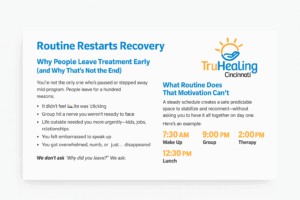You don’t look like someone who needs treatment.
You wake up to your alarm. Handle your meetings. Make people laugh when it’s awkward. Maybe you even keep the peace at home. No one sees the way you’re unraveling—because you’ve mastered the art of holding it together.
Until it stops working.
If you’re reading this, it’s probably because something cracked. Maybe it was a missed flight. A memory you couldn’t recall. A DUI that shook you more than you expected. Maybe it was nothing dramatic—just the slow dread of knowing you can’t keep doing this.
So what happens if you stop running and start rebuilding?
That’s what a men’s residential treatment program offers. Not bootcamp. Not a lecture hall. And definitely not a punishment. Just a place where you don’t have to pretend you’re okay.
Here’s what it’s really like inside TruHealing Cincinnati’s residential treatment program—for men who are still functioning, but barely.
You’re Not Broken. You’re Burned Out.
One of the biggest lies high-functioning men tell themselves is: “I’m still doing fine.” You mean you haven’t lost your job. Your family still takes your calls. You’re still making it to the gym or putting dinner on the table.
But that’s not the same as being okay.
Most of the men who enter our Cincinnati program weren’t in full collapse. They were just tired of spinning plates while their inner life fell apart.
One client, a middle-school principal, said it like this:
“I didn’t come because I crashed. I came because I knew I was about to—and I wanted to beat it to the punch.”
Residential treatment isn’t for people who “can’t handle life.” It’s for people who are done pretending they can handle it all alone.
What the First 72 Hours Feel Like
Let’s not sugarcoat it: those first few days can be disorienting.
You hand over your phone. Someone else handles the schedule. You’re not the one in control anymore—and for a man who’s always been the fixer, that can be unnerving.
But then something surprising happens.
You sleep through the night for the first time in weeks. You laugh at a joke you didn’t expect. You eat a full meal and realize you were starving.
Those early days are about stabilization. You’re not expected to “get better” right away. You’re just allowed to be—without pressure to perform.

Real Schedule. Real Structure. Real Rest.
One of the first things our clients notice is how much better they feel with a routine they didn’t have to design.
It’s not rigid. It’s predictable—and that alone can feel revolutionary when you’ve been living in chaos.
Here’s a sample daily schedule at TruHealing Cincinnati:
| Time | Activity |
|---|---|
| 7:00 AM | Wake up, shower, quiet coffee time |
| 8:00 AM | Breakfast + daily intentions |
| 9:00 AM | Clinical group (topics like shame, trauma, coping) |
| 11:00 AM | Skills training or experiential therapy |
| 12:30 PM | Lunch and casual peer time |
| 2:00 PM | One-on-one counseling or case management |
| 4:00 PM | Movement, recreation, or reflection groups |
| 6:00 PM | Dinner + journaling/reflection |
| 7:30 PM | Optional evening group or wind-down |
You’re never on your own, but you’re never smothered either.
As one client from Lexington put it:
“It was the first time I’d had a routine that didn’t revolve around either hustling or hiding.”
It’s Not “Group Therapy.” It’s Real Talk.
We get the hesitation. You imagine a circle of strangers trauma-dumping while you sit there with your arms crossed, thinking, “I’m not like these people.”
Here’s the truth: You are.
Because addiction doesn’t care what kind of job you have. And recovery doesn’t require you to spill your deepest wounds on day one.
Our groups aren’t one-size-fits-all. Some are about skills. Some focus on communication. Some are just spaces where men talk honestly—for maybe the first time in years.
And no, you’re not required to cry. But you might.
“Group was the part I dreaded most. Now it’s the one thing I miss. I got to say stuff out loud that I didn’t even realize I needed to hear myself say.”
— Former client, 2023
You’re Still a Man With a Life
Being in residential care doesn’t mean you’re cut off from the outside world. We respect that you may have family, a business, or other commitments.
That’s why we help you communicate with loved ones, make practical re-entry plans, and stay engaged with what matters to you—without letting it overwhelm the healing process.
Our case managers work with men returning to places like Springfield, Ohio or Louisville, KY, building step-down plans that support—not disrupt—their real lives.
What Men Actually Get Out of Residential Treatment
Most men come in thinking, “I just need to quit.” And yes, getting sober is part of it. But most leave with much more:
- Clarity around what they actually want
- New tools for managing stress that don’t involve numbing
- A way to feel things without fear or shame
- Boundaries that hold
- A support network that doesn’t revolve around bar tabs
Real Men. Real Wins.
“I didn’t think I’d connect with anyone here. Then a guy said, ‘I’m good at work but suck at being still.’ And I was like—yep, that’s me.”
“It wasn’t soft. It was direct. That’s what I needed. Someone to call me out without making me feel like trash.”
“It gave me back my mind. That’s the best way I can put it.”
FAQ: Men’s Residential Treatment Program at TruHealing Cincinnati
Do I have to hit rock bottom to qualify for residential treatment?
Not at all. In fact, high-functioning men are often the best candidates—because they’re still able to engage, reflect, and build on their strengths. You don’t need to lose everything to reclaim your life.
What makes a men’s program different from co-ed treatment?
Our men’s program is designed to remove performance dynamics and gender-based discomfort. Men often open up more fully in male-only settings, especially when unpacking anger, grief, pride, or pressure.
Can I keep my job while in treatment?
Residential care is immersive, so you won’t be working during your stay. However, we offer FMLA support, and our team can help you navigate conversations with employers or plan for medical leave.
What if I’ve tried treatment before and it didn’t stick?
That’s common—and not a failure. We focus on helping men figure out why past approaches didn’t hold and build something more sustainable this time.
How long is the program?
Typical stays range from 28–45 days, depending on your needs, progress, and goals. Our team will collaborate with you on what makes the most sense.
If You’re Still “Holding It Together,” That Might Be the Problem
High-functioning doesn’t mean healthy. It means you’re doing enough to keep the house from burning down—but you’re still living in smoke.
What happens if you step outside the fire?
We’re not here to shame you. We’re here to help you reset—with dignity, structure, and support that actually works for who you are.
Call (888) 643-9118 or visit our residential treatment program in Cincinnati, Ohio to learn more. You don’t have to lose everything to start healing something.

